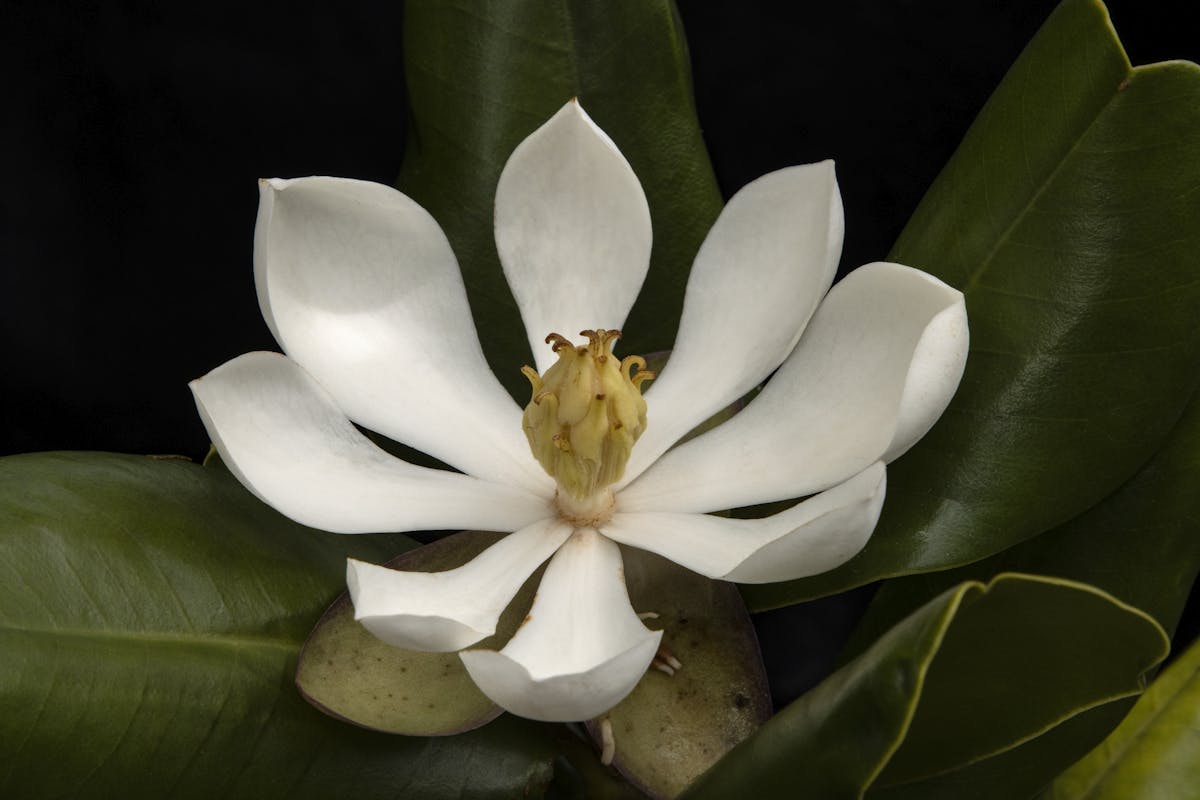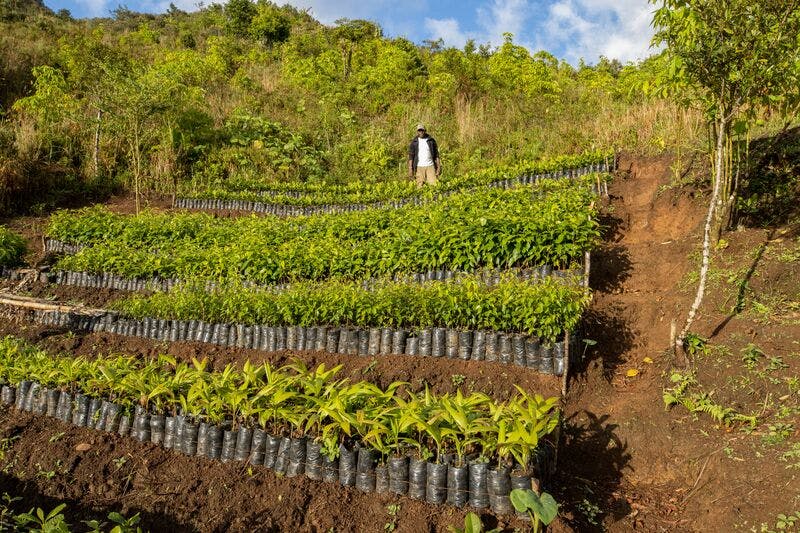 BACK TO PRESS
BACK TO PRESSRewilding project is bringing back a critically endangered magnolia in Haiti, where deforestation has ravaged the country
Haiti National Trust hires local community members to plant native species to restore shrinking forests
For immediate release, October 26, 2022
In a moment in history for Haiti marred by social and political upheaval and sustained environmental disasters, Re:wild partner Haiti National Trust (HNT) is highlighting a small win that has been helping bring some stability and hope to local communities in and around Grand Bois National Park. To combat deforestation in the park and with the help of hired community members, HNT has planted over 30,000 seedlings and plant cuttings in the last five months, already nearing their original goal of 50,000 planted this year and exceeding original expectations.
“The past months have been very difficult for Haiti and its people, and it feels like we only hear about Haiti when bad or negative things happen, but Haiti is not just that,” said Anne-Isabelle Bonifassi, executive director of Haiti National Trust. “Haiti is a rich and beautiful land with amazing biodiversity that we need to protect. Biodiversity ignores political conflicts. This is our heritage and despite the many challenges that this civil unrest brings, our teams are in the field, working with local communities on rewilding our country for future generations.”
Less than 1% of Haiti’s original forests remain and Grand Bois’ forests are being cut down for building materials, slash-and-burn agriculture, and charcoal. In 2019, HNT began collecting seeds from endemic species, many of which are only found in the Massif de la Hotte mountain range in southeastern Haiti. They have cared for those seeds, raised some in nurseries, and started planting them in the wild this year across 120 acres (about 50 hectares) in Grand Bois, which is a biodiversity hotspot.
HNT’s project has been so successful that they have bumped their goal of 50,000 plants a year to 60,000, helping to accelerate reforesting efforts.
“These ecosystems cannot continue to wait, if we don’t act now, Haiti is facing mass extinction and countrywide ecologic collapse,” Bonifassi said. “The future of our country and its people depend on restoration initiatives like these. Our work is vital for Haiti’s health and success, so we continue to work hard to ensure our forests can thrive with native species. The success we’ve already had is a great sign and fills us with hope that we can rewild Grand Bois, which is among Haiti’s last wild and irreplaceable places.”
Unlike other planting projects aimed solely at providing economic benefits--often for timber production--HNT’s efforts have focused on native species that are specifically adapted to the region and help provide food and shelter for local wildlife. In addition to planting seedlings, the project is removing invasive species that often outcompete native species for resources.
Local community members have been supportive of this work to help maintain the health of Grand Bois. Deforestation of these forests has increased landslides in surrounding villages, worsening water quality for human consumption. HNT has trained and hired dozens of locals to care for seedlings in their nurseries, remove invasive species, and aid planting initiatives within the park.
“I want the park to be like it was when I was a kid, it was lush and dense with plants,” said Elizé Roberty, a resident of Sevré, a village in the buffer zone of Grand Bois National Park, who has received training from HNT to support these rewilding efforts. “But I have hope now because we are working to make the park as it used to be. And it’s working. I think our reforestation activities will help everyone, especially the people in my village. When there are hurricanes, now we will have less damage, fewer landslides, and less flooding in our area because the trees in the park will help prevent these disasters.”
The team is also bringing back the critically endangered Ekman’s magnolia, a critically endangered species with showy white flowers that is an iconic species in the region and attracts pollinators like native beetles. Hispaniola is known for its five native magnolia species, including the recently rediscovered northern Haiti magnolia that had been lost to science for nearly 100 years. With support from Re:wild, HNT has begun growing Ekman’s magnolia at its Nan Pan’m and Saut Blanche nurseries in Grand Bois.
Rewilding Grand Bois’ forests is critical to the survival of numerous species unique to Haiti, many threatened by extinction. In 2015 the government of Haiti declared Grand Bois a national park because of its rich ecosystem. The entire park is also considered a Key Biodiversity Area (KBA) known as Parc National Naturel de Grand Bois. KBAs are critical to the persistence of life on Earth. Grand Bois is home to dozens of threatened species of plants, birds, amphibians, reptiles, and mammals. This is the number one priority conservation site in the country and one of the most important sites for amphibians in the world.
Re:wild and HNT have been working to restore Haiti’s ecosystems for nine years, focusing on the Grand Bois region and creating Haiti’s first-ever private reserve in 2019. This is a part of Re:wild’s broader work to protect and restore Caribbean islands.
“Restoring the forest ecosystems of Grand Bois will not only help prevent potentially deadly landslides but will also help support one of the planet’s most threatened biodiversity hotspots,” said Jenny Daltry, Caribbean alliance director for Re:wild and Fauna & Flora International (FFI). “Deforestation is a serious threat to both human wellbeing and unique wildlife all over the Caribbean region. That’s why Re:wild and FFI have combined forces to raise awareness and support to protect and restore Caribbean islands at risk—including Hispaniola.”
This project was made possible in part by the generous support of Arbeiter-Samariter-Bund.
# # #

Re:wild
Re:wild protects and restores the wild. We have a singular and powerful focus: the wild as the most effective solution to the interconnected climate, biodiversity and human wellbeing crises. Founded by a group of renowned conservation scientists together with Leonardo DiCaprio, Re:wild is a force multiplier that brings together Indigenous peoples, local communities, influential leaders, nongovernmental organizations, governments, companies and the public to protect and rewild at the scale and speed we need. Learn more at rewild.org.
Haiti National Trust
Haiti National Trust is a private, non-profit organization in Haiti to save and protect native ecosystems for future generations. We are the lead organization that acquires land to conserve natural habitats and the rich endemic biodiversity of Haiti. We establish protective measures, restore degraded lands, and partner with local communities by providing education and assistance to develop sustainable livelihoods and improve their well-being. Learn more at haititrust.org.


